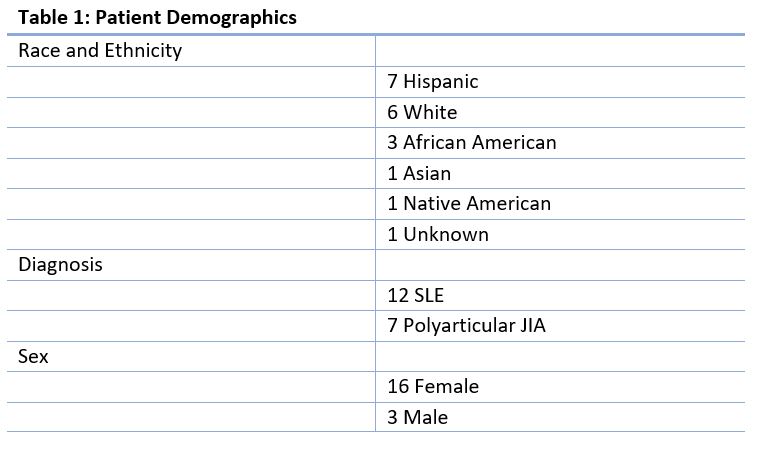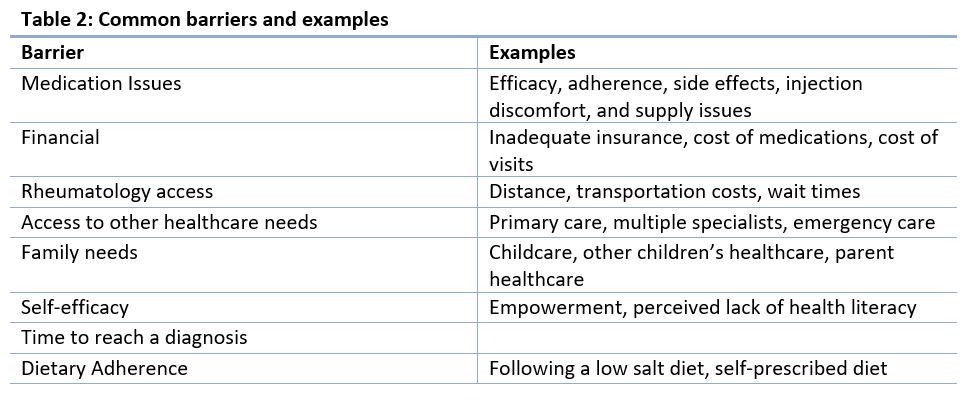Session Information
Session Type: Poster Session A
Session Time: 6:00PM-7:00PM
Background/Purpose: Pediatric rheumatic diseases are known to have disparities in disease outcomes, but many drivers of these inequities are unknown. Social determinants of health are a source of health inequities and can present as barriers to care. To better understand impacts of social determinants of health we aim to identify barriers to care children with rheumatic disease face from a patient and family perspective.
Methods: Children and young adults (YA) aged 11-22y diagnosed with juvenile systemic lupus erythematosus and juvenile idiopathic arthritis and their caregivers were recruited from Riley Childrens Hospital outpatient pediatric rheumatology clinic during clinic visits or via phone call and email over a period of approximately four months. Semi-guided interviews were conducted via Zoom and consisted mostly of small focus groups of similarly aged children/YA and groups of caregivers. Interviews were conducted in English and Spanish. Interviews were recorded, transcribed, and thematic analysis conducted utilizing NVIVO software.
Results: 19 children/YA and 16 parents participated in group interviews (Table 1). Common barriers to care are described in Table 2. The most common barriers to care identified by caregivers were medication issues, financial, access to pediatric rheumatology care, access for other healthcare needs, and family needs including sibling and parent health. A surprising common theme was caregivers negative perception of their own self efficacy in healthcare and in both their own and the publics health literacy surrounding childhood rheumatic disease. The most common barriers identified by children/YA were medication issues, financial, and access to pediatric rheumatology care. Children and YA focused more on quality of life (Table 3) including pain and fatigue, school attendance and accommodations, and concerns about future independence. The COVID 19 pandemic did not present a large barrier to healthcare for most patients. Many families identified protective factors such as early introduction of the patient being an active participant in their own care. There was a strong desire for more family and peer support groups from both parents and children/YA.
Conclusion: Barriers to care are common for children with rheumatic disease and common themes are identified by both parents and children/YA. An overarching theme is that families prioritize their childrens health to overcome barriers. Peer and parent support groups are of great interest to many patients and families and are a potential solution to perceived poor self-efficacy and health literacy. More studies are needed to understand the relationship between the experience of barriers to care to disease activity, health related quality of life and healthcare satisfaction. Future steps include distribution of surveys utilizing the information discovered from the interviews to a larger cohort of patients/families. Survey data will be examined to explore differences in experiences of barriers to care by race/ethnicity to better assess relationships to health inequities. Patient/family perspectives will also be compared to the perspectives of providers.
To cite this abstract in AMA style:
Kwan O, Garcia G, Johnson K, Oliver M, Tarvin S, Tori A, Stevens B, Rodriguez M. Identification of Barriers to Care Experienced by Children with Rheumatic Disease: A Qualitative Study [abstract]. Arthritis Rheumatol. 2023; 75 (suppl 4). https://acrabstracts.org/abstract/identification-of-barriers-to-care-experienced-by-children-with-rheumatic-disease-a-qualitative-study/. Accessed .« Back to 2023 Pediatric Rheumatology Symposium
ACR Meeting Abstracts - https://acrabstracts.org/abstract/identification-of-barriers-to-care-experienced-by-children-with-rheumatic-disease-a-qualitative-study/



